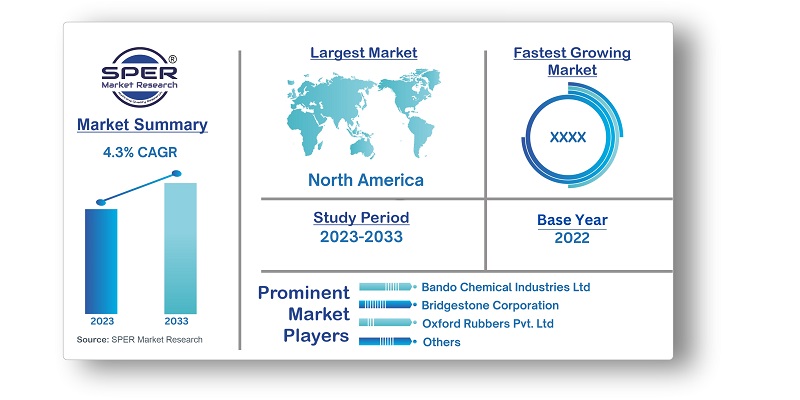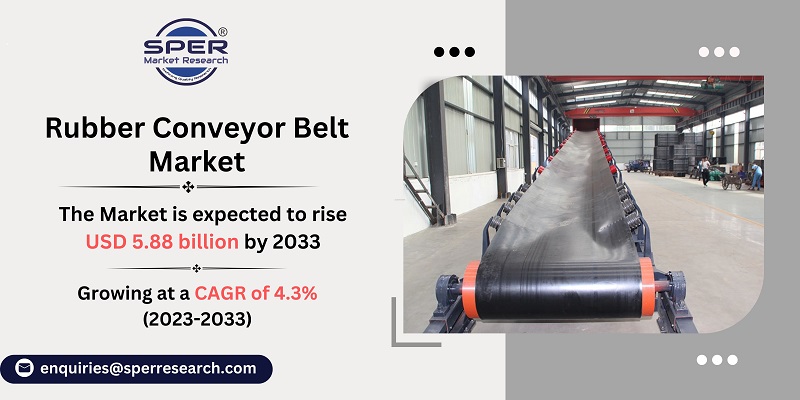
Rubber Conveyor Belt Market Growth, Size, Trends, Share, Revenue, Demand and Future Outlook
Rubber Conveyor Belt Market Size- By Material, By Application, By End User- Regional Outlook, Competitive Strategies and Segment Forecast to 2033
| Published: Dec-2023 | Report ID: IACT23211 | Pages: 1 - 218 | Formats*: |
| Category : Information & Communications Technology | |||
- July 2021: A coal mine in Queensland's Central Bowen Basin had to change its existing equipment to reverse the grade of its conveyors. As an alternative to moving uphill from tail to head, all primary gate conveyors would go downward. An energy-generating downhill conveyor system was built, supplied, and put into service by Fenner Dunlop in answer to a challenging engineering problem.
- August 2020: The building of a $23.5 million facility in Kwinana, Western Australia, has been announced by Fenner Dunlop. Fenner Dunlop and Siempelkamp have extended their long-standing partnership in the manufacturing of superior conveyor belts by working together to commission the third line, which includes the best multi-piston press in the world and associated machinery. The plant's capacity will increase by fifty percent with the addition of the extra press line. It is anticipated that work on the site will start in March 2021 and be finished in December 2021. The new press line will start full production in January 2022.


| Report Metric | Details |
| Market size available for years | 2019-2033 |
| Base year considered | 2022 |
| Forecast period | 2023-2033 |
| Segments covered | By Material, By Application, By End User |
| Regions covered | North America, Asia-Pacific, Latin America, Middle East & Africa and Europe |
| Companies Covered | Bando Chemical Industries Ltd., Bridgestone Corporation, Fenner Grouo Holdings Ltd., Mitsuboshi Belting Ltd/JP, Muller Beltex B.V., Oriental Rubber Industries Pvt. Ltd., Oxford Rubbers Pvt. Ltd., The Yokohama Rubber Co. Ltd., T-Rex Rubber International B.V., Wuxi Boton Belt Co. Ltd., Others |
- Companies offering maintenance and repair services for conveyor systems
- Distributors and Dealers
- Engineering and Design Firms
- Industries that use conveyor belts in their operations, such as mining, manufacturing, food processing, packaging, and logistics
- Investors interested in the industrial and manufacturing sector, including conveyor belt manufacturing
- Manufacturers and Suppliers
- Providers of aftermarket services, including spare parts and accessories for conveyor belts
- Others
| By Material: |
|
| By Application: |
|
| By End User: |
|
- Global Rubber Conveyor Belt Market Size (FY’2023-FY’2033)
- Overview of Global Rubber Conveyor Belt Market
- Segmentation of Global Rubber Conveyor Belt Market By Material (Solid Woven Belts, Steel Reinforced Conveyor Belts, Textile Reinforced Conveyor Belts)
- Segmentation of Global Rubber Conveyor Belt Market By Application (Light-weight, Medium-Weight, Heavy-Weight)
- Segmentation of Global Rubber Conveyor Belt Market By End User (Cement Manufacturing, Metal Processing, Mining, Power Generation, Recycling)
- Statistical Snap of Global Rubber Conveyor Belt Market
- Expansion Analysis of Global Rubber Conveyor Belt Market
- Problems and Obstacles in Global Rubber Conveyor Belt Market
- Competitive Landscape in the Global Rubber Conveyor Belt Market
- Impact of COVID-19 and Demonetization on Global Rubber Conveyor Belt Market
- Details on Current Investment in Global Rubber Conveyor Belt Market
- Competitive Analysis of Global Rubber Conveyor Belt Market
- Prominent Players in the Global Rubber Conveyor Belt Market
- SWOT Analysis of Global Rubber Conveyor Belt Market
- Global Rubber Conveyor Belt Market Future Outlook and Projections (FY’2023-FY’2033)
- Recommendations from Analyst
1.1. Scope of the report1.2. Market segment analysis
2.1. Research data source2.1.1. Secondary Data2.1.2. Primary Data2.1.3. SPER’s internal database2.1.4. Premium insight from KOL’s2.2. Market size estimation2.2.1. Top-down and Bottom-up approach2.3. Data triangulation
4.1. Driver, Restraint, Opportunity and Challenges analysis4.1.1. Drivers4.1.2. Restraints4.1.3. Opportunities4.1.4. Challenges4.2. COVID-19 Impacts of the Global Rubber Conveyor Belt Market
5.1. SWOT Analysis5.1.1. Strengths5.1.2. Weaknesses5.1.3. Opportunities5.1.4. Threats5.2. PESTEL Analysis5.2.1. Political Landscape5.2.2. Economic Landscape5.2.3. Social Landscape5.2.4. Technological Landscape5.2.5. Environmental Landscape5.2.6. Legal Landscape5.3. PORTER’s Five Forces5.3.1. Bargaining power of suppliers5.3.2. Bargaining power of buyers5.3.3. Threat of Substitute5.3.4. Threat of new entrant5.3.5. Competitive rivalry5.4. Heat Map Analysis
6.1. Global Rubber Conveyor Belt Market Manufacturing Base Distribution, Sales Area, Product Type6.2. Mergers & Acquisitions, Partnerships, Product Launch, and Collaboration in Global Rubber Conveyor Belt Market
7.1. Global Rubber Conveyor Belt Market Value Share and Forecast, By Material, 2023-20337.2. Solid Woven Belts7.3. Steel Reinforced Conveyor Belts7.4. Textile Reinforced Conveyor Belts
8.1. Global Rubber Conveyor Belt Market Value Share and Forecast, By Application, 2023-20338.2. Light-weight8.3. Medium-Weight8.4. Heavy-Weight
9.1. Global Rubber Conveyor Belt Market Value Share and Forecast, By End User, 2023-20339.2. Cement Manufacturing9.3. Metal Processing9.4. Mining9.5. Power Generation9.6. Recycling
10.1. Global Rubber Conveyor Belt Market Size and Market Share
11.1. Global Rubber Conveyor Belt Market Size and Market Share By Material (2019-2026)11.2. Global Rubber Conveyor Belt Market Size and Market Share By Material (2027-2033)
12.1. Global Rubber Conveyor Belt Market Size and Market Share By Application (2019-2026)12.2. Global Rubber Conveyor Belt Market Size and Market Share By Application (2027-2033)
13.1. Global Rubber Conveyor Belt Market Size and Market Share By End User (2019-2026)13.2. Global Rubber Conveyor Belt Market Size and Market Share By End User (2027-2033)
14.1. Global Rubber Conveyor Belt Market Size and Market Share By Region (2019-2026)14.2. Global Rubber Conveyor Belt Market Size and Market Share By Region (2027-2033)14.3. Asia-Pacific14.3.1. Australia14.3.2. China14.3.3. India14.3.4. Japan14.3.5. South Korea14.3.6. Rest of Asia-Pacific14.4. Europe14.4.1. France14.4.2. Germany14.4.3. Italy14.4.4. Spain14.4.5. United Kingdom14.4.6. Rest of Europe14.5. Middle East and Africa14.5.1. Kingdom of Saudi Arabia14.5.2. United Arab Emirates14.5.3. Rest of Middle East & Africa14.6. North America14.6.1. Canada14.6.2. Mexico14.6.3. United States14.7. Latin America14.7.1. Argentina14.7.2. Brazil14.7.3. Rest of Latin America
15.1. Bando Chemical Industries Ltd.15.1.1. Company details15.1.2. Financial outlook15.1.3. Product summary15.1.4. Recent developments15.2. Bridgestone Corporation15.2.1. Company details15.2.2. Financial outlook15.2.3. Product summary15.2.4. Recent developments15.3. Fenner Grouo Holdings Ltd.15.3.1. Company details15.3.2. Financial outlook15.3.3. Product summary15.3.4. Recent developments15.4. Mitsuboshi Belting Ltd/JP15.4.1. Company details15.4.2. Financial outlook15.4.3. Product summary15.4.4. Recent developments15.5. Muller Beltex B.V.15.5.1. Company details15.5.2. Financial outlook15.5.3. Product summary15.5.4. Recent developments15.6. Oriental Rubber Industries Pvt. Ltd.15.6.1. Company details15.6.2. Financial outlook15.6.3. Product summary15.6.4. Recent developments15.7. The Yokohama Rubber Co. Ltd.15.7.1. Company details15.7.2. Financial outlook15.7.3. Product summary15.7.4. Recent developments15.8. SEO Valley Solutions Private Ltd.15.8.1. Company details15.8.2. Financial outlook15.8.3. Product summary15.8.4. Recent developments15.9. T-Rex Rubber International B.V.15.9.1. Company details15.9.2. Financial outlook15.9.3. Product summary15.9.4. Recent developments15.10. Wuxi Boton Belt Co. Ltd.15.10.1. Company details15.10.2. Financial outlook15.10.3. Product summary15.10.4. Recent developments15.11. Others
SPER Market Research’s methodology uses great emphasis on primary research to ensure that the market intelligence insights are up to date, reliable and accurate. Primary interviews are done with players involved in each phase of a supply chain to analyze the market forecasting. The secondary research method is used to help you fully understand how the future markets and the spending patterns look likes.
The report is based on in-depth qualitative and quantitative analysis of the Product Market. The quantitative analysis involves the application of various projection and sampling techniques. The qualitative analysis involves primary interviews, surveys, and vendor briefings. The data gathered as a result of these processes are validated through experts opinion. Our research methodology entails an ideal mixture of primary and secondary initiatives.



Frequently Asked Questions About This Report
PLACE AN ORDER
Year End Discount
Sample Report
Pre-Purchase Inquiry
NEED CUSTOMIZATION?
Request CustomizationCALL OR EMAIL US
100% Secure Payment






Related Reports
Our Global Clients
Our data-driven insights have influenced the strategy of 200+ reputed companies across the globe.




















